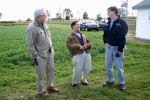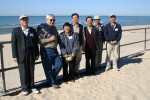Taiwan Ecological Research Network representatives visit LTER's Kellogg Biological Station.
Phase II of the International Workshop on Long Term Ecological Research in Agricultural Ecosystems took place last October at the Kellogg Biological Station (KBS ) LTER. The six-day event was organized by KBS and the Taiwan Ecological Research Network (TERN). The workshop’s objective was to familiarize TERN guests with the operations of KBS, its investigators, and administrators, as they prepared to establish a new agricultural LTER in Taiwan. Six TERN scientists spent nearly a week touring KBS, meeting with the LTER executive committee, and visiting southwest Michigan regional research and commercial agricultural sites. They ended the week by participating in the KBS LTER All Investigator Meeting at Michigan State University.
Chau Chin Lin, information manager for the Taiwan Forestry Research Institute and a future TERN executive committee member observed: "What was attempted at KBS was to understand how effective data management facilitates research and delivers services for use by ecologists. I was very impressed to find out that there is a sound philosophy for research data management at the KBS site." Chin Lin also noted that, although IT techniques had changed tremendously in the past 20 years, the data management philosophy and legacy at KBS maintains a continuous and complete track of the data. He was particularly impressed with how KBS has used EML (ecological metadata language) successfully to modernize its data management while benefiting scientists to expand data sharing to all other LTER sites in the US.
The TERN visitors found KBS LTER’s other operations very much to their liking. According to Shan Ney Huang, Director of Agricultural Experiment Stations in Taiwan, the main site experimental design and management was admirable. He found KBS’s project foci -- plant competition, Carbon and Nitrogen allocation, herbivory, pathogenesis and gene transfer, nutrient availability and soil organic matter dynamics, and the modeling of system-wide outputs -- to be well discussed and organized, helping to facilitate research goals focused on the impact of agricultural activities on environmental sustainability. "Those findings can be adapted for us to set up the research in subtropical Taiwan with our intensive cropping systems," he noted.
Chi Ling Chen from the Taiwan Agricultural Research Institute added: "We are trying to assemble the agricultural LTER site in Taiwan in order to understand the mechanisms of the ecological system for agriculture in the subtropics." She said the agricultural LTER site would probably be located at the Taiwan Agricultural Research Institute. "The information we learned from our visit will be very useful for assembling the agriculture LTER site in Taiwan," she said.
For Zueng Sang Chen, Head of the Department of Agricultural Chemistry, National Taiwan University, "the most successful thing for me is the design of the project under different cropping systems. KBS has a good operations and management system to handle all monitoring and data management and to share all the metadata to the related PIs and other public researchers." Chen said KBS’s efforts to provide education and extension activities for nearby schools and the community increases the center’s influence and adds value to the station.
KBS and TERN researchers hope to continue their collaborative relationship throughout the establishment of the new site by addressing critical needs and facilitating an enduring international partnership.
Andrew Corbin
Kellogg Biological Station LTER
For information on Phase I of the International Workshop, see The Network Newsletter Vol. 16 No. 1 Spring 2003.

 Enlarge this image
Enlarge this image
